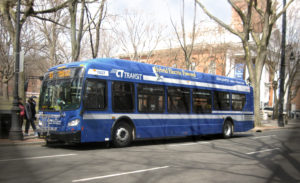More electric buses, incentives to buy EVs on the way
The Connecticut Department of Transportation is receiving a $7.4 million grant from the Federal Transit Administration for the purchase of 10 battery electric buses, and the state is introducing new incentives for residents to buy electric vehicles, in the ongoing effort to cut emissions.
 In addition to the 10 buses, the DOT will use the federal grant to acquire 10 DC fast chargers. The upgrades are targeted for the CTtransit Waterbury division and will make that city”™s bus depot the first bus facility in the state capable of running a 100% battery electric bus transit fleet.
In addition to the 10 buses, the DOT will use the federal grant to acquire 10 DC fast chargers. The upgrades are targeted for the CTtransit Waterbury division and will make that city”™s bus depot the first bus facility in the state capable of running a 100% battery electric bus transit fleet.
The FTA grant will be matched with $5.7 million in state funding and other sources, for a total project cost of $13.1 million. Gov. Ned Lamont said the ultimate goal is the electrification of the nearly 100 transit buses and paratransit vans used in the Waterbury fleet.
“Not only does the purchase of these 10 new electric buses mean that we can make the Waterbury fleet fully electric,” Lamont said, “but it brings us one step closer to our state”™s goal of a fully electric bus fleet statewide by 2035.”
“This funding will help reduce the impacts of pollution and climate change while making critically needed upgrades to our transportation network,” Richard Blumenthal and Chris Murphy, the state”™s two U.S. Senators, said in a joint statement. “This is yet another example of how Connecticut is leading the way to modernize our national transportation grid. We are committed to fighting for every dollar possible as we work to upgrade Connecticut”™s transportation infrastructure.”
“Increasing the amount of no-emission battery electric buses in our state is wonderful news. This is a significant investment to fight air pollution and advance racial justice in Waterbury,” Robert Goodrich, co-founder of R.A.C.C.E., said. “Communities of color and families with low income as well as children walking to school will be less burdened by commercial vehicle emissions than they were before.”
“Expanding the deployment of electrified medium and heavy-duty vehicles in densely populated areas, like Waterbury, will greatly cut down the harmful particulate matter that contributes to poor air quality and health problems,” Alex Rodriguez, a climate advocate with Save the Sound, said.
“Additionally, the state”™s transportation sector generates nearly 40% of its greenhouse gas emissions,” Rodriguez continued. “The widespread adoption of this technology will be key to Connecticut meeting its climate change mandates. Thanks to this investment, we are one step closer to a climate resilient, clean transportation future.”
Meanwhile, the governor has announced a suite of improvements to the state”™s consumer rebate program, Connecticut Hydrogen and Electric Automobile Purchase Rebate (CHEAPR), which will provide more state residents with more affordable access to purchase or lease an EV.
The newly approved incentives, which become available this month, increase rebate amounts and expand the CHEAPR program to cover used EVs as well as new EVs and provide an additional incentive for income-eligible consumers.
The new standard rebate applied at the point of sale will continue to be referred to as CHEAPR, while Rebate+ New and Rebate+ Used will refer to the new post-purchase incentives available to eligible consumers.
“Since 2015, this program has put over $12.1 million back in the pockets of Connecticut drivers who have purchased or leased an EV, which has helped to put almost 7,000 EVs on Connecticut”™s roads,” Lamont said, noting that the latest move makes Connecticut “one of just a few states to expand EV incentives to used vehicles.”
The CHEAPR program provides a cash rebate for any Connecticut resident who purchases or leases an eligible EV costing up to $42,000. EVs covered by CHEAPR include battery electric (BEV), plug-in hybrid electric (PHEV), and fuel cell electric vehicles (FCEV).
Since early 2020, CHEAPR has been administered by the Connecticut Department of Energy and Environmental Protection (DEEP) and guided by input from the CHEAPR Board.
Connecticut needs approximately 125,000 to 150,000 EVs by 2025 and 500,000 EVs by 2030 to meet its statutorily mandated greenhouse gas reduction target.
For new vehicles, the CHEAPR rebate is now:
- $2,250 for a new BEV (previously $1,500)
- $750 for a new PHEV (previously $500)
- $7,500 for a new FCEV (previously $5,000)
Under the Rebate+ New program, eligible purchasers or lessees may receive an additional:
- $2,000 for a new BEV
- $1,500 for a new PHEV
- $2,000 for a new FCEV
Under the Rebate+ Used program, eligible purchasers or lessees of qualified used vehicles will receive:
- $3,000 for a used BEV
- $1,125 for a used PHEV
- $7,500 for a used FCEV
The incentives under the Rebate+ Used and Rebate+ New program will be offered as long as funding remains available or until Dec. 31, when the rebate levels will be returned to the previous base-level.